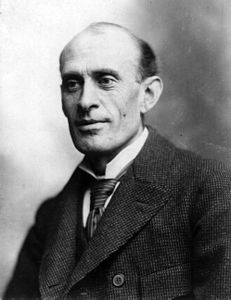Analysis of The wind
Eugene Field 1850 (St. Louis) – 1895 (Chicago)
Cometh the Wind from the garden, fragrant and full of sweet singing--
Under my tree where I sit cometh the Wind to confession.
"Out in the garden abides the Queen of the beautiful Roses--
Her do I love and to-night wooed her with passionate singing;
Told I my love in those songs, and answer she gave in her blushes--
She shall be bride of the Wind, and she is the Queen of the Roses!"
"Wind, there is spice in thy breath; thy rapture hath fragrance Sabaean!"
"Straight from my wooing I come--my lips are bedewed with her kisses--
My lips and my song and my heart are drunk with the rapture of loving!"
The Wind he loveth the red, red Rose,
And he wooeth his love to wed:
Sweet is his song
The Summer long
As he kisseth her lips so red;
And he recketh naught of the ruin wrought
When the Summer of love is sped!
(AGAIN THE TALE)
Cometh the Wind from the garden, bitter with sorrow of winter.
"Wind, is thy love-song forgot? Wherefore thy dread lamentations?"
Sigheth and moaneth the Wind: "Out of the desolate garden
Come I from vigils with ghosts over the grave of the Summer!"
"Thy breath that was fragrant anon with rapture of music and loving,
It grieveth all things with its sting and the frost of its wailing
displeasure."
The Wind maketh ever more moan and ever it giveth this answer:
"My heart it is numb with the cold of the love that was born of the
Summer--
I come from the garden all white with the wrath and the sorrow of Winter;
I have kissed the low, desolate tomb where my bride in her loveliness
lieth
And the voice of the ghost in my heart is the voice that forever
outcrieth!"
(AGAIN THE SONG)
The Wind he waileth the red, red Rose
When the Summer of love is sped--
He waileth above
His lifeless love
With her shroud of snow o'erspread--
Crieth such things as a true heart brings
To the grave of its precious dead.
| Scheme | ab cadc b da efggfxF x h c bh aah hihhcihi g eFjjfxf |
|---|---|
| Poetic Form | Tetractys (30%) |
| Metre | 1001101010011110 101111110011010 1001001011010010 011101110110010 1111011010110010 1111101011011010 11110111101101 111101111111010 11011011111010110 01110111 0111111 1111 0101 1110111 011110101 10101111 0101 1001101010110110 11111011111 1010111010010 111101110011010 1111101110110010 11111110011110 010 0111011010110110 1111110110111110 10 111010111010010110 111011001111001 1 0011010111011010 1 0101 01110111 10101111 1101 1101 101111 11110111 10111101 |
| Closest metre | Iambic hexameter |
| Characters | 1,844 |
| Words | 359 |
| Sentences | 13 |
| Stanzas | 13 |
| Stanza Lengths | 2, 4, 1, 2, 7, 1, 1, 1, 2, 3, 8, 1, 7 |
| Lines Amount | 40 |
| Letters per line (avg) | 36 |
| Words per line (avg) | 9 |
| Letters per stanza (avg) | 109 |
| Words per stanza (avg) | 27 |
Font size:
Submitted on May 13, 2011
Modified on March 05, 2023
- 1:46 min read
- 60 Views
Citation
Use the citation below to add this poem analysis to your bibliography:
Style:MLAChicagoAPA
"The wind" Poetry.com. STANDS4 LLC, 2024. Web. 29 Apr. 2024. <https://www.poetry.com/poem-analysis/13109/the-wind>.


Discuss this Eugene Field poem analysis with the community:
Report Comment
We're doing our best to make sure our content is useful, accurate and safe.
If by any chance you spot an inappropriate comment while navigating through our website please use this form to let us know, and we'll take care of it shortly.
Attachment
You need to be logged in to favorite.
Log In